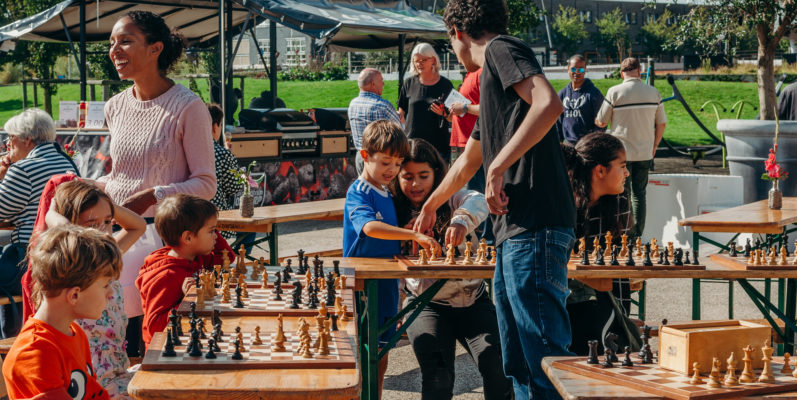Education and youth: society as a learning environment
Education faces major social challenges. At the same time, the way we structure our education system has a profound effect on how society functions. By increasing the capacity of the education system to innovate, education can be the driving force behind an open, sustainable and inclusive society.

“Young people are the future”, but to what extent will the future they inherit serve their interests? They will face major problems for which there are currently no solutions, including the climate crisis, growing inequality and the negative effects of digitalisation. Kennisland strives for a sustainable and inclusive society, and that starts with our education system. But schools are not the only places where children and young people learn, live and develop. This is why we are expanding our approach to include education and young people.
We focus on the innovative capacity of teachers, as we have done for many years. We help teachers, school leaders and administrators anticipate the future, and facilitate and run future-proof, inclusive schools. The living environment of young people is an increasingly important touchstone in our approach.
What we have learned in practice
- Young people possess knowledge and skills that teachers and administrators do not.Young people possess knowledge and skills that teachers and administrators do not. Society and our education system can make much better use of these.
- Intensive interaction with society at large is essential to deliver good education. Schools and education institutes alone cannot respond adequately to the complexity of contemporary society.
- Our public systems are based around “diagnosing”, “selecting” and “determining”, and often fail to take sufficient account of individual talents and the speed at which the current generation of young people develop.
- Teachers are increasingly rejecting the role of “production line worker” and are instead becoming architects of the education they provide. The system environment of policymakers, exam designers and developers of teaching methods is slowly losing influence to the creative professionalism of teachers++InnovationInnovation is steadily losing its negative connotations in education, as it is less and less about large-scale changes to the education system and is instead increasingly seen as a core aspect of the teaching profession.. This is improving our education system and making it more attractive.
- School leaders and administrators now increasingly lead innovative knowledge organisations where learning networks and innovative leadership play a key role. They embrace interaction with society and are open to the outside world.
- Policymakers are increasingly part of a learning system, rather than a monitoring system++Learning systemOne example of this change is in the education inspection service. In recent years, they have explored how they can contribute to the development of schools by offering more constructive advice.
Kennisland believesThe system environment of policymakers, exam designers and developers of teaching methods is slowly losing influence to the creative professionalism of teachers. in the perspective and potential of the new generation. If we want young people to develop optimally, we must ensure that their living and learning environment also continuously develops. We seek out and design space for innovation to help them excel, and we contribute to a learning system that supports them and a society that listens to them.
Approach and successes
We transform our ambitions for education and young people into concrete approaches, including local Incubators, where we provide space and support for collective experiments by participants from diverse backgrounds. We also organise Student Labs, where students themselves are given a leading role in tackling problems in education. These include increasing equality of opportunity, simplifying the transition from intermediate to higher vocational education and designing good civic education.
With Education Pioneers and the Teachers’ Development Fund that resulted from it, we developed a programme to help professionals in education put their own ideas into practice and develop as innovators. One of the most groundbreaking projects we have designed to include society at large in education was the Our New School challenge, which crowdsourced innovative ideas for new schools from residents of Amsterdam.
We have also developed leadership programmes, such as the Course for Senior School Management and Innovative Leadership in Primary Education. The Education Innovation Impulse was a major innovation programme that taught us a great deal about innovation for and by schools in learning networks. And we don’t limit ourselves to education in the Netherlands: our work abroad includes Ednovators in the education system in Hong Kong.
Read more about our approaches and methods here.
Do you recognise this story, and do you see opportunities that we can work with? Then please contact us via km@kl.nl.
Publications | News articles | Opinion articles | Projects | Events

